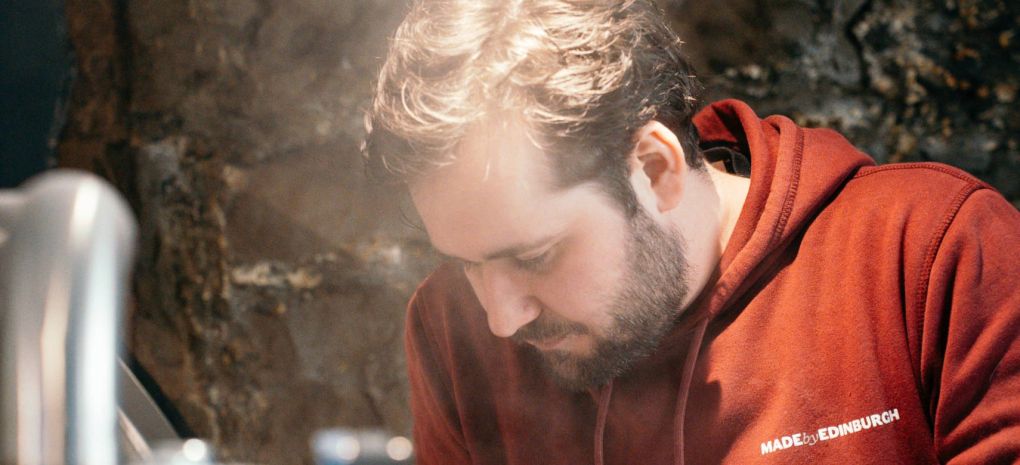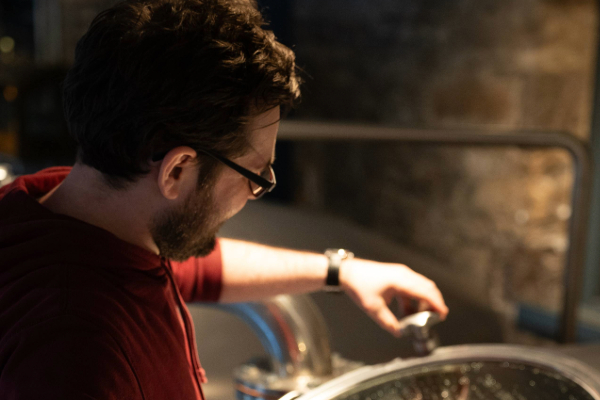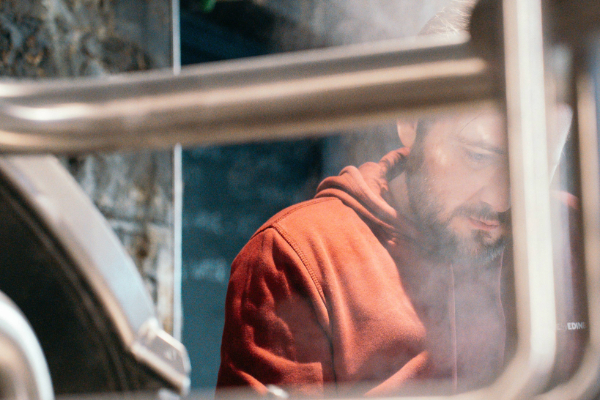
14/10/2024 Discover how Holyrood Distillery’s Ian Clement’s passion for craft, innovation, and consumer engagement is shaping the future of Scotch whisky
The beginning of Ian Clement’s distilling career may have been happenstance, with his degree in tourism landing him a tour guide position at The Scotch Whisky Experience, a tourist attraction where visitors can explore the world of Scotch whisky. But he soon developed a passion for whisky and is now a distiller. Bartender Spirits Awards learned about Ian Clement’s whisky journey and how his stint as a tour guide laid the foundation for his career as a distiller.
Tell us a little about your background and journey to distilling.
My first proper introduction to Scotch whisky was as a visitor assistant at The Scotch Whisky Experience in Edinburgh, where I was also a tour guide with access to a plethora of information about the whisky industry and the production process. Later on, I went on to work as a bar manager at the in-house McIntyre Gallery Bar. This exposure to the whisky industry piqued my interest in distilling, leading me to join Holyrood Distillery as a duty manager and later on to be invited to be a part of the production team.
What does your day look like in your current role?
As a distiller at Holyrood Distillery, I am responsible for the day-to-day operations that include all aspects of production in the distillery: mashing, distillation, and diluting our spirit before it goes into casks at the warehouse. On certain occasions, I also get the opportunity to create my own recipes, which is probably the most exciting part of the job and something that very few distillers get to do. Given that it is an incredibly fast-paced environment, I tend to have many busy days, some of which start in the wee hours of the morning, so naturally, I consume a significant amount of coffee in order to keep me going through the day.

Image Title and Credits: Distiller Ian Clement
What inspired you to become a distiller?
Scotch whisky has such a fascinating and rich history and heritage. If you speak to any Scottish person, they know that whisky is a part of their national identity, but I don’t think many realize how deep that connection runs or even how revered it is across the rest of the world. Inspired by this history, I believe that contributing to the Scotch Whisky story, even in a small way, is a tremendous honor.
Also read: The Dominance of Top Spirits Categories: Analyzing Consumer Drinking Preferences
How do you think a distiller can help in driving marketing and sales personally?
One thing I noticed as a distillery tour guide is that whisky enthusiasts are always eager to talk to the distillers and to have them pass on their knowledge. I think people are always looking for authenticity and this exchange of information gives the consumers a little insight into the process as well. In my personal opinion, interacting with consumers and letting them know the ins and outs of the process could help with generating interest at least.

Image Title and Credits: Ian Clement of Holyrood Distillery
Define a good distiller.
A good distiller should possess the ability to handle challenging circumstances, react promptly to modifications, and resolve problems efficiently. Regardless of how many times you repeat the process, there will always be an unforeseen moment when a component of the kit malfunctions or fails to function as intended. In such situations, you need to think quickly so that you can identify the problem and solve it. You should also have a strong work ethic and be a team player. Most importantly, you should love distilling and being part of it. If you have that passion, then the rest falls into place naturally. Based on my experience, the learning curve is pretty steep but incredibly rewarding in the end.
What's your elevator pitch to a bartender when pitching your brand?
Located in the heart of Edinburgh, we're a young single-malt Scotch whisky distillery that's incredibly experimental. Unlike other distilleries, we experiment with various types of barley, including specialty and heritage/heirloom malts, to achieve unique flavors. We also use different strains of yeast during fermentation to give our spirit unique characteristics. Moreover, we don't really have a "house style" or a core range so you can expect each release we make to be drastically different from the previous one and they align with our aim to showcase something new.
Also read: The 10 Best Bartenders to Follow on Instagram to Learn the Tricks of the Trade
[[relatedPurchasesItems-31]]
What are the current challenges the spirits industry is facing, according to you?
The Scotch whisky industry is currently experiencing a decline in sales, which is causing concern as it evokes memories of the 1980s "Whisky Loch" surplus. Personally, I don't believe we've reached that point yet, and there's a significant likelihood that we may never reach it. However, we must remain mindful of this issue and improve our ability to communicate the unique qualities of our product because it all comes back to consumers looking for authenticity in your product. Just affixing an age statement to a bottle or advertising a single malt that has undergone double, triple, or quadruple cask maturation is becoming outdated.
What trends do you anticipate in the beverage industry in the coming months? Or where do you see the domestic craft distilling scene going? What's next for the industry?
We're seeing a premiumization of the spirits world as of late, especially in the world of mezcal and rum. This trend has both positive and negative implications. While it's commendable to see some of these small-scale and craft producers receiving the recognition they deserve due to the exceptional quality of their spirits, I worry that we may be driving away some consumers and transforming what was once an affordable luxury for most people into something more exclusive. For instance, there were certain spirits that I used to enjoy eight years ago that I don't buy now because the price attached to them is getting silly. On a more positive note, it's wonderful to see whisky become a more global product. For the longest time, the focus was mainly on Scotland, Ireland, the States, and Japan to a certain extent. However, there's a growing interest in whiskies produced outside of "The Big 4", particularly in Europe, and I hope to witness the growth of this enthusiasm.
Header image by Ian Clement
Related links
Mezcal's Evolution in the Spirits World Plus the Top 15 Mezcals for Bartenders
Leading Whisky Importers in the USA: Top Players Shaping the Market



